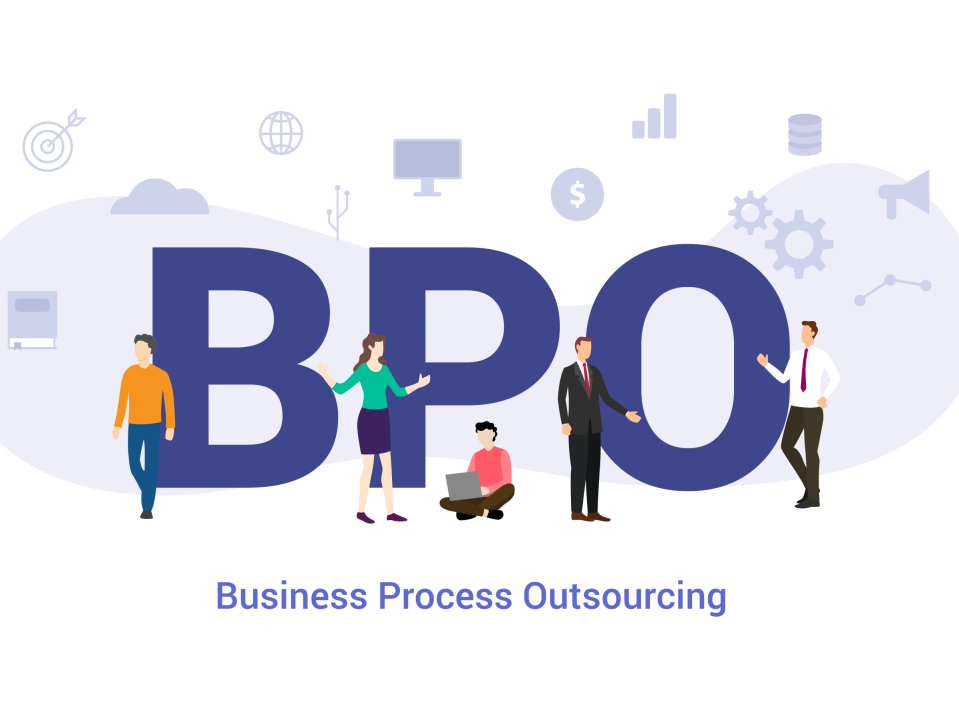What Is Business Process Services (BPO) – 2024: Everything You Need To Know Gor Success
Business process outsourcing (BPO) means getting other companies to handle parts of your business. Instead of just hiring freelancers for specific tasks like video editing, BPO involves outsourcing entire business functions like marketing or accounting to external providers.
So, in this article on ‘What is business process services (BPO),’ we’ve provided a thorough exploration covering definitions, types, benefits, drawbacks, and more. It will help you understand the importance of BPO in this digital era. Let’s get started!
What Does BPO Stand For In Business?
According to Forbes, in simple terms, BPO stands for Business Process Outsourcing. It’s a strategic move wherein organizations hand off certain non-core tasks to specialized third-party providers. Instead of managing everything internally, companies choose to outsource tasks like payroll, customer support, or data entry.
The appeal of BPO services lies in their ability to boost efficiency, cut costs, and enable businesses to focus on their core competencies. By partnering with external experts, companies can streamline operations, tap into specialized skills, and remain agile in a dynamic market. Whether it’s managing behind-the-scenes tasks or enhancing customer interactions, BPO in business provides organizations with the tools they need to thrive in today’s global economy.
Types Of BPO: Supply Chain And Services

5 types of BPO services
Here are the different types of business process services. Take a moment to consider which type of best fits your needs.
Front-Office BPO
Front-Office business process outsourcing services involve outsourcing tasks like tech support, customer service, sales, and marketing, crucial for maintaining positive client interactions. The decision to outsource is often driven by the technical expertise required and the ability to handle tasks off-site. By delegating responsibilities such as web development and customer support lines to external partners, businesses can access specialized talent and reduce operational expenses.
Back-Office BPO
Unlike Front-Office, Back-Office BPO covers a wide array of behind-the-scenes tasks such as IT support, accounting, HR functions, and quality assurance. It offers specialized subsets like IT-Enabled Services (ITES) IT BPO, Legal Process Outsourcing (LPO), and Knowledge Process Outsourcing (KPO), tailored to specific business needs. By delegating these responsibilities to external partners, companies can redirect their focus towards core objectives, avoiding the hassle of internal training and onboarding. This streamlined approach not only optimizes resource allocation but also positions businesses for success in today’s competitive market landscape.
Offshore BPO
Offshore Business Process Outsourcing (BPO) is known as a business practice entailing the delegation of services to overseas locations. This approach is motivated by several compelling factors, including resource availability, political stability, reduced labor expenses, and the prospect of tax advantages.
A prominent illustration of this phenomenon is observed in companies outsourcing their customer service operations to call center providers across international borders. Through this strategic maneuver, enterprises gain access to proficient labor and services at a comparatively lower cost, consequently driving down their operational expenditures. As a result, companies can potentially offer more competitive pricing for their products or services, thereby delivering tangible benefits to end-users.
Nearshore BPO
Nearshore BPO is a smart way to outsource tasks by connecting with neighboring or nearby countries for business process services. Unlike offshore BPO, where services are obtained from far-off places, nearshore outsourcing makes the most of being close geographically. This closeness encourages better collaboration and smoother communication between the hiring company and the service provider, as there are fewer time zone differences to contend with. With nearshore BPO, organizations can enjoy the benefits of outsourcing while ensuring seamless coordination, which boosts efficiency and fuels business growth. This approach not only simplifies operations but also helps in aligning cultures, fostering synergy between partners.
Onshore BPO
Onshore BPO, also referred to as domestic BPO, means outsourcing services to a provider within the same country as the hiring company. While it may not save as much money as offshore or nearshore options, Onshore BPO offers distinct benefits like cultural alignment and easier communication. This closeness fosters better collaboration and understanding between the client and the service provider, resulting in improved efficiency and customer satisfaction. Moreover, Onshore BPO allows businesses to keep their operations local while still enjoying the perks of outsourcing, such as access to specialized skills and the ability to scale up.
Looking For a Dedicated Team?
A Dedicated Team might be the best solution in your case. Get in touch with us and we’ll help you choose the best IT outsourcing company based on your business needs and requirements.
Advantages And Disadvantages Of Using BPO Services
Indeed, every endeavor comes with its own set of pros and cons, and business process outsourcing (BPO) is no exception. In this section, we’ll outline the key advantages and disadvantages associated with utilizing this service.
Advantages

Benefits of using BPO solutions
Hiring BPO companies offers several potential advantages. Let’s delve into each of these benefits.
- Operational Flexibility Improvement: By outsourcing noncore functions, companies can prioritize their core strengths, promoting creativity and adaptability.
- Access to Technological Advancements: Specialized BPO firms invest in leading-edge technologies, granting clients access to groundbreaking innovations they might otherwise miss out on.
- Acquiring Talent: BPO companies employ skilled professionals in various domains, such as human resources and payroll management, enabling clients to utilize their expertise for competitive advantage.
- Cost-effectiveness: Offshoring to regions with favorable tax and labor structures yields substantial cost reductions. Furthermore, BPO IT streamlines expenses like office rents and software expenditures.
- Streamlined Reporting Solutions: Leveraging AI and ML capabilities, BPO providers deliver swift and precise reporting, encompassing financial projections, thus refining decision-making processes.
- Enhanced Flexibility to Adapt: With access to top-tier talent and cutting-edge technologies, firms can swiftly adjust to industry shifts and evolving consumer needs, maintaining a competitive edge.
Disadvantages
Despite the numerous benefits of business process services, it does come with drawbacks. Companies opting for BPO might face risks like data breaches or communication challenges, leading to project delays. Moreover, they might overlook the actual operating expenses associated with BPO solutions.

Drawbacks of using BPO solutions
Another potential downside is the negative reaction from customers towards outsourcing, especially if they perceive it as compromising quality or affecting local employment opportunities.
- Public Opposition: Outsourcing to international or nearby talent can raise public perception concerns, potentially seen as sacrificing domestic jobs and raising worries about the quality of services from non-domestic talent.
- Acclimation Period: BPO firms require time to grasp the client’s business, customers, and needs. This learning process may disrupt the client’s operations, prompting stakeholder concerns. It’s vital to gradually approach outsourcing and inquire about the BPO provider’s strategies to address this challenge.
- Diminished Oversight: Outsourcing entails ceding some control, unlike internal operations where managers ensure consistency and quality. Selecting a reputable BPO company capable of upholding the client’s reputation is crucial. Reviewing past client experiences can offer insights into the BPO provider’s quality control practices.
Bottom line: What Is Business Process Services (BPO)
In answering the question “what is business process services (BPO),” we find that it’s a versatile strategy accessible to companies of all sizes. Its aim? To streamline operations, cut costs, and stay ahead in today’s global market. By grasping the various types of BPO and weighing their pros and cons, businesses can smartly decide which tasks to delegate and which service providers to engage. In an ever-changing business landscape, BPO stands out as a crucial instrument for achieving operational efficiency and sustained expansion.
Savvycom – Your Business Process Services Partner!
From Tech Consulting, End-to-End Product Development to IT Outsourcing Services! Since 2009, Savvycom has been harnessing the power of BPO solutions that support business’ growth across a variety of industries. We can help you to build high-quality software solutions and products as well as deliver a wide range of related professional services.
Savvycom is right where you need. Contact us now for further consultation:
- Phone: +84 24 3202 9222
- Hotline: +84 352 287 866 (VN)
- Email: [email protected]
FAQs:
What is BPO customer service?
Customer service in the BPO (business processing outsourcers) industry refers to specialized outsourcing companies that handle customer queries via various channels such as email, chat, phone, social media, and more. They address customer concerns effectively using digital tools like live chat, chatbots, and co-browsing. Positive interactions with these service providers can lead to repeat customers and word-of-mouth recommendations.
Why is BPO important for business?
- BPO allows companies to concentrate on their core business strategies while outsourcing non-core tasks.
- It offers cost-effectiveness by lowering operational expenses.
- BPO provides access to specialized skills and expertise.
- It facilitates scalability, enabling businesses to adjust their operations as necessary.


